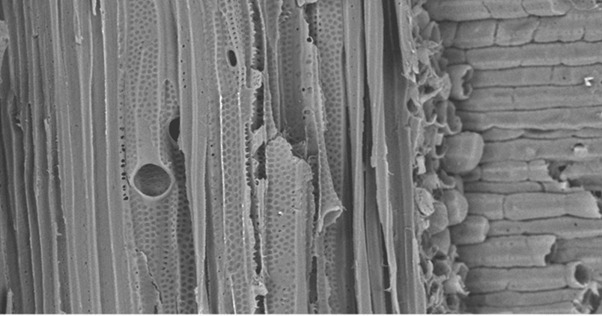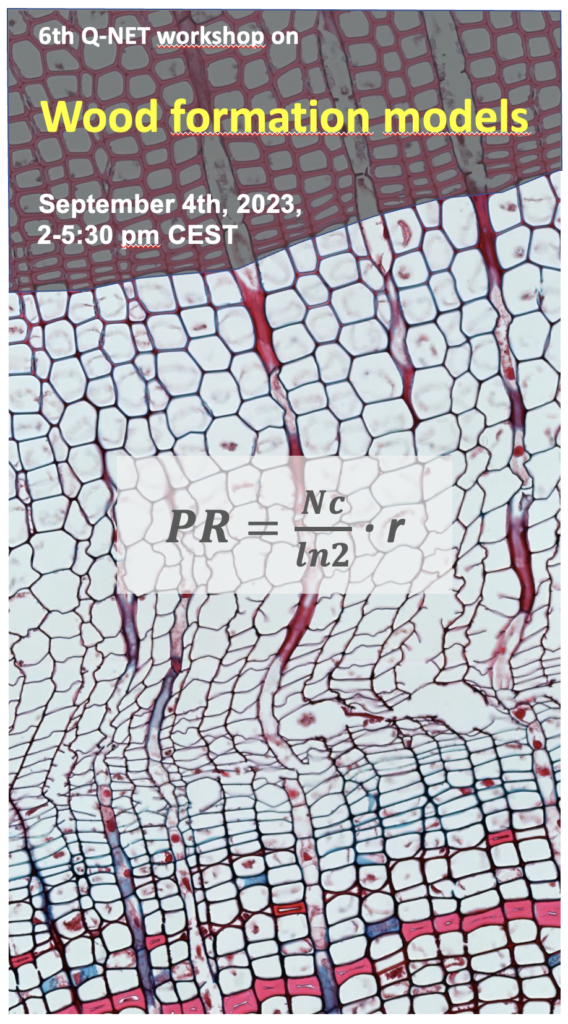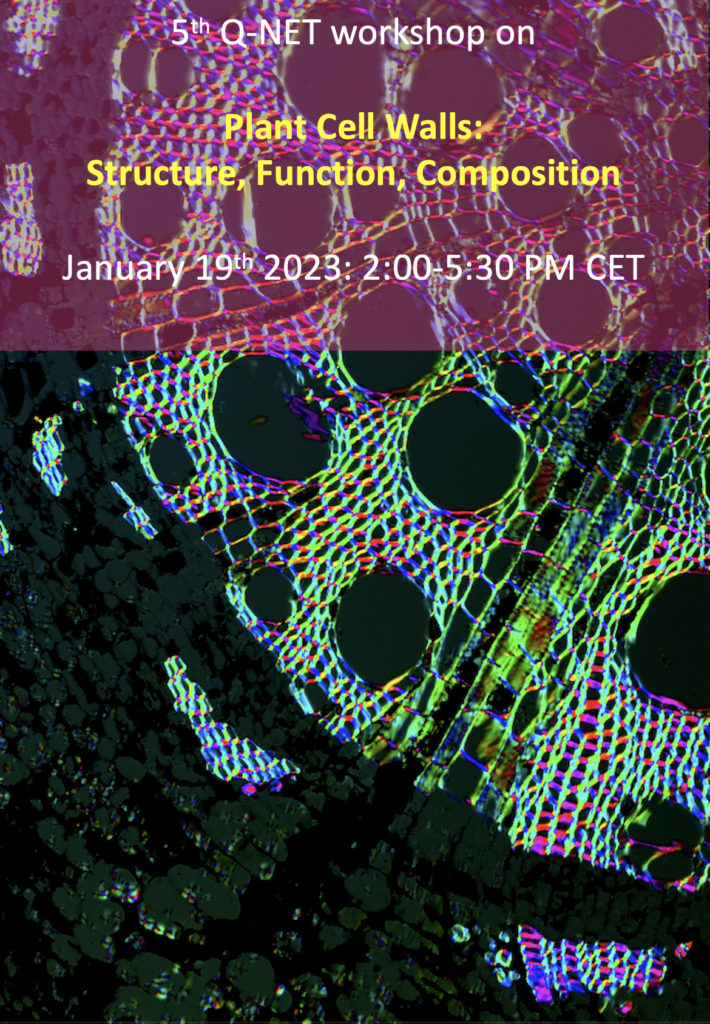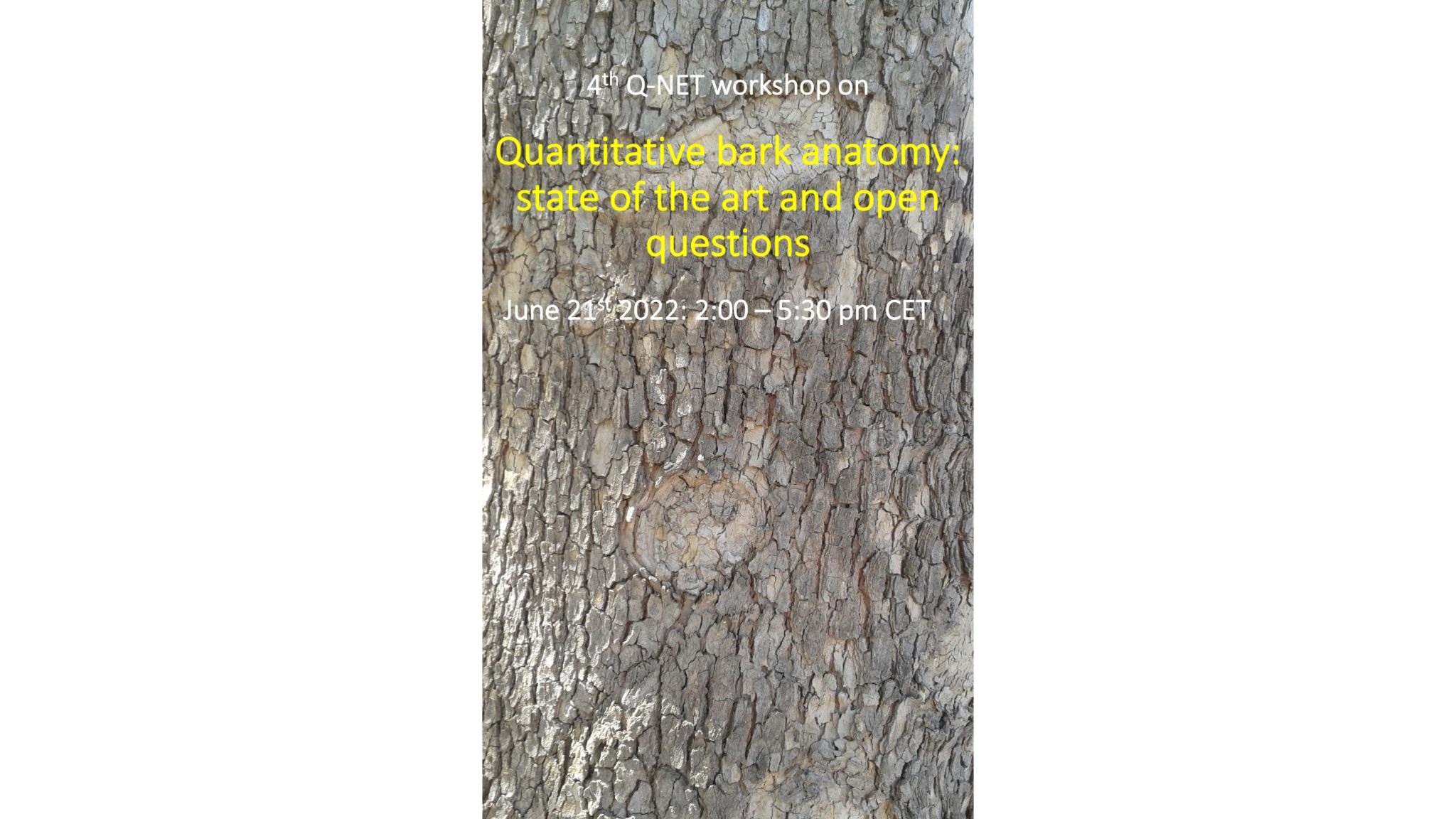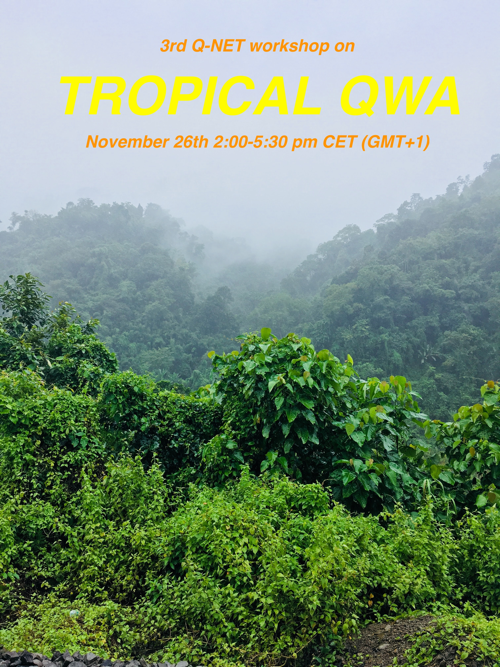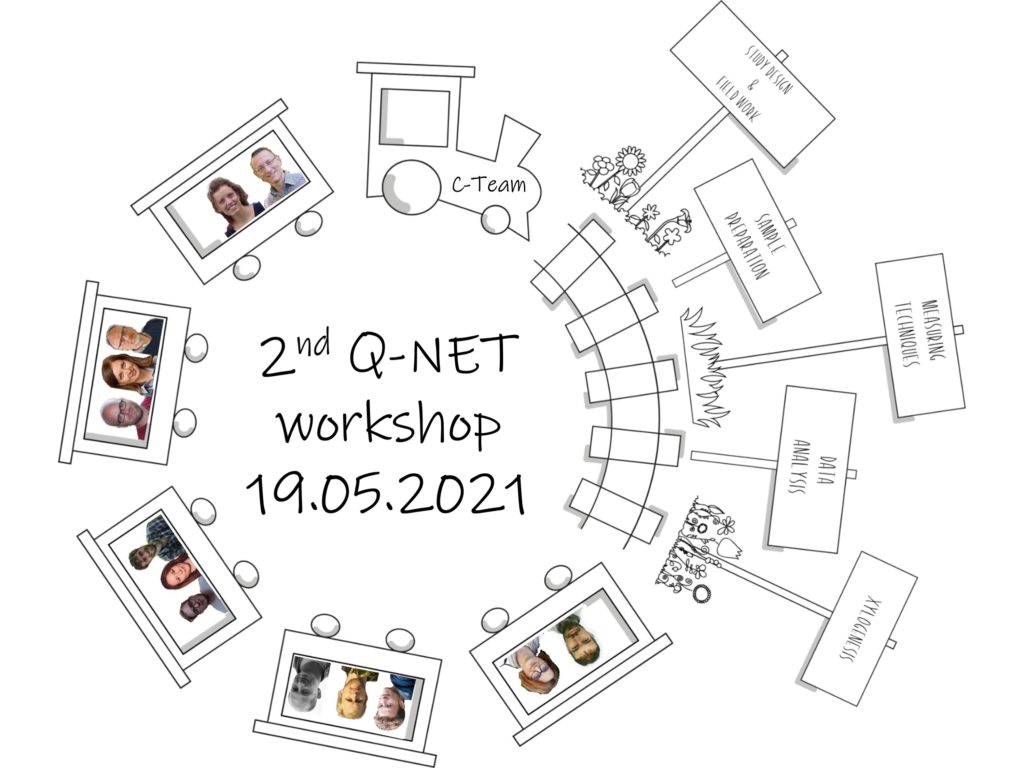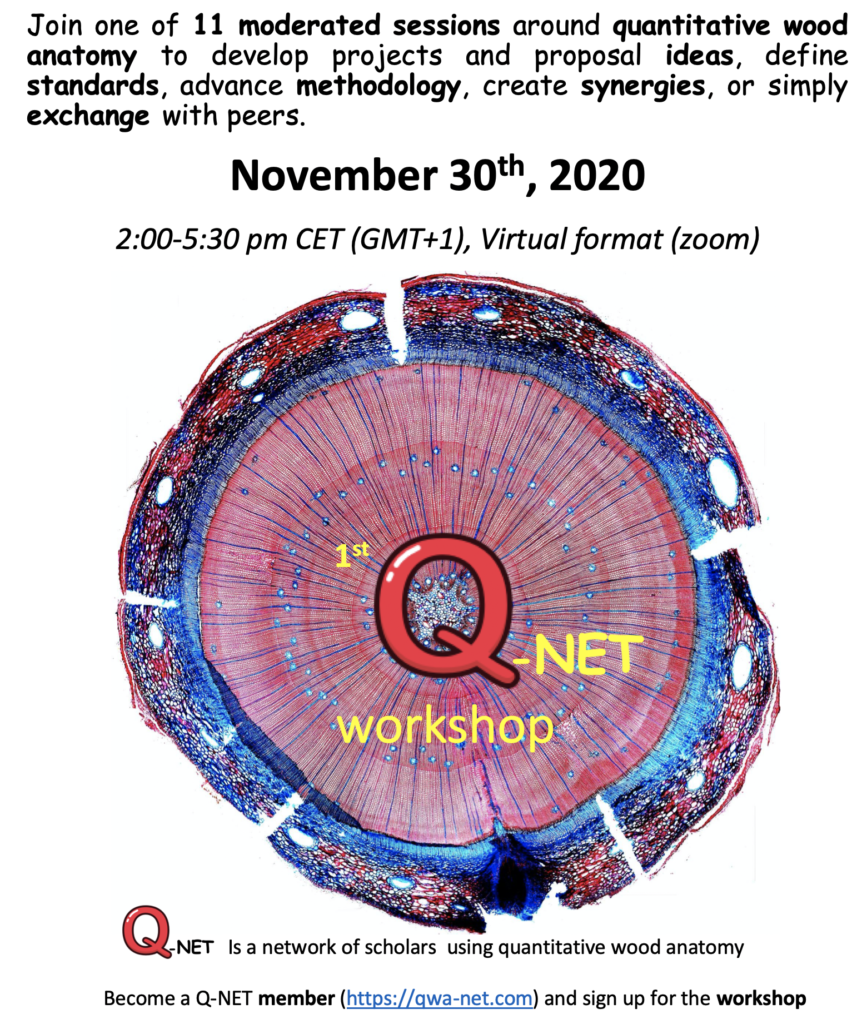Workshops
When and where to Interact?
Q-NET Workshops are (virtual) meetings where the members can actively suggest, discuss, define, and draft Q-NET projects during topical sessions. Participation is reserved to Q-NET members and free of charge.
Session topics are suggested by Q-NET members and the coordination team before the workshop.
Workshops are organized by the coordination team. These are announced via the Q-NET webpage (see below) and other channels.
Workshop 9, May 28th, 2025, 2:00-4:30 PM CEST (GMT+2)
Exploring Xylem Structure and Function: Unveiling the Pathways of Water Transport
Organizers: Rosana Lopez Rodriguez, Alan Crivellaro, Georg von Arx
Topic:
This workshop delves into the intricate structure and function of xylem tissues, focusing on the mechanisms of water transport within plants. Participants will explore recent advancements in xylem anatomy, the dynamics of water movement, and the implications for plant physiology and ecology.
Program (times in CEST pm):
2:00 – 2:10 Welcome and introduction to the workshop (G. von Arx, R. Lopez Rodriguez)
2:10 – 2:25 Xylem structure and function in tree seedlings (Barbara Beikircher)
2:30 – 2:45 How does soybean breeding impact stem xylem characteristics? (Jose Costa Netto)
2:45 – 2:50 Surprise
2:50 – 3:05 Xylem conduit dimensions show no hydraulic bottleneck along the axis of an angiosperm tree (Swetlana Kreinert)
3:10 – 3:30 30 Comparing ring specific conductivity and vulnerability across different wood anatomies (Jaycie Fickle)
3:30 – 4:00 Discussion in 4 breakout rooms
4:00 – 4:30 Plenary discussion & closing (G. von Arx, R. Lopez Rodriguez, A. Crivellaro)
No registration required! A zoom link to participate in the workshop will be sent out to Q-NET members shortly beforehand.
Workshop 8, November 5th, 2024, 2:00-5:00 PM CET (GMT+1)
Xylem and phloem interaction
Organizers: Ilana Shtein, Sabine Rosner, Angela L. Prendin and Rosana Lopez
Topic:
Xylem and phloem are responsible for water and photosynthate transport throughout the plant body. Both are derived from vascular cambium and influenced by environmental changes. Their functional and structural interactions and coordination, though not studied enough, are a very important subject in plant biology.
Program (times in CET pm):
2:00 – 2:10 Welcome and introduction to the workshop (G. von Arx, I. Shtein, S. Rosner)
2:14 – 2:45 Xylem and phloem formation (P. Prislan)
2:45 – 3:15 Methods in phloem research (J. Liesche)
3:15 – 3:30 Break
3:30 – 4:00 Plasticity of xylem vs phloem under drought stress (A. Balzano)
4:00 – 4:30 The impact of axial variation in xylem and phloem anatomy on plant metabolism (G. Petit)
4:30 – 5:00 Discussion on future research directions, open questions & closing (S. Rosner, I. Shtein, R. Lopez)
No registration required! A zoom link to participate in the workshop will be sent out to Q-NET members shortly beforehand.
Workshop 7, Apr 30th, 2024, 2:00-5:30 PM CET (GMT+1)
Discrete anatomical features in wood as signals of tree response to extreme event
Organizers: Veronica de Micco, Alan Crivellaro & Georg von Arx
Topic:
Discrete anatomical features in tree rings are a treasure of environmental information. This workshop aims to provide an overview of such features that can be found in species from different biomes, highlighting both the potential ecological information they provide and the methodological challenges that remain. Come prepared to discuss with us and bring new ideas!
Program (times in CEST pm):
- 14:00 – 14:10 Welcome and introduction to the workshop (G. von Arx, A. Crivellaro, V. de Micco)
- Seminar presentations:
- 14:10 – 14:40 Holger Gärtner: “An introduction to discrete wood anatomical features”
- 14:40 – 15:10 Alma Piermattei: “Blue rings and frost rings as a response to cold spells”
- 15:10 – 15:40 Martin De Luis: “From false rings to IADFs”
- 15:40 – 15:50 Break
- 15:50 – 16:20 Veronica De Micco: “IADFs: hardwoods vs softwoods”
- 16:20 – 16:50 Achim Bräuning, Sugam Aryal, Martin Häusser: “How to integrate growth data and continuous and discrete wood anatomical data for ecological applications: a case study from Corsica”
- 16:50 – 17:20 Matt Becker and Savannah Collins-Key: “Resin canals in QWA”
- 17:20 – 17:30 Discussion on future research directions – open questions (G. von Arx, A. Crivellaro, V. de Micco)
No registration required!
Workshop 6, Sep 4th, 2023, 2:00-5:30 PM CEST (GMT+2)
Wood formation models
Organizers: Annemarie Eckes-Shephard, Antoine Cabon & Georg von Arx
Topic:
Wood formation models can be used to bridge the gap between xylogenesis and wood anatomy data. These datasets are also crucial to test the countless hypotheses which wood formation models incorporate in research fields such as forestry, dendroclimatology and basic research. The workshop aims to make wood formation models more accessible to xylogenesis and wood anatomy scientists. This will be a highly interactive workshop using menti-meter (a survey app). Be prepared to participate in surveys during the workshop, about the data types you produce and what you need from a wood formation model for it to be useful to you.
Program (times in CEST pm):
2:00 – 2:10 Welcome, winner of new Q-NET logo (G. von Arx)
2:10 – 2:25 Introduction to wood formation models (A. Eckes-Shephard)
2:25 – 2:50 Xylogenesis and wood anatomy data meet wood formation models (Cyrille Rathgeber, G. von Arx)
2:50 – 3:20 Vladimir Shishov & Valentina Butto: Vaganov-Shashkin (VS) & VS-oscilloscope
3:20 – 3:40 David Drew: Drew & Downes 2015
3:40 – 3:50 Break
3:50 – 4:10 Andrew Friend: RINGS
4:10 – 4:30 Felix Hartmann: XyDyS2
4:30 – 5:00 Annemarie Eckes-Shephard: Deleuze & Houllier, model & showcasing
5:00 – 5:30 Discussion on future research directions, open questions & closing (A. Cabon, A. Eckes-Shephard, G. von Arx)
No registration required!
Workshop 5, Jan 19th, 2023, 2:00-5:30 PM CET (GMT+1)
Plant cell walls – structure, function, composition
Organizers: Ilana Shtein & Veronica de Micco, support- Angela L. Prendin
Topic:
Plant cell walls are a fundamental aspect of plant structure and function. They play major role in growth and development, including in response to biotic and abiotic factors, support and signaling. Anatomically cell walls are extremely interesting, as their ultrastructure and composition differs with tissue type and among taxons. This workshop will delve into the state of the art in cell walls research- evolution, composition, methods and more.
Program (1 single zoom session with a 15’ break):
- 14:00 – 14:15 Plant cell walls – an introduction (G. von Arx, I. Shtein, V. de Micco)
- Seminar presentations:
- 14:15 – 14:45 Zoë A. Popper: “If walls could talk… The evolution and adaptations of plant and algal cell walls.”
- 14:45 – 15:15 Teresa Terrazas and Agustin Maceda: The lignocellulose composition in vascular tissue with emphasis on succulent stems
- 15:15 – 15:45 Andrew Groover: “Genetic regulation of vessel traits affecting water transport and drought response in poplar”
- 15:45 – 16:00 Break
- 16:00 – 16:30 Notburga Gierlinger: “Raman imaging of wood: chemistry in context with anatomy”
- 16:30 – 17:00 Simon Poppinga: “Biomechanics and functional morphology of motile plant structures”
- 17:00 – 17:30 Discussion on future research directions – open questions (V. de Micco, I. Shtein, A.L. Prendin)
No registration required!
Workshop 4, Jun 21st, 2022, 2:00-5:30 PM CET (GMT+1)
Quantitative bark anatomy – state of the art and open questions
Organizers: Ilana Shtein & Alan Crivellaro
Topic: Bark fulfills essential functions in the living plant and yields a wealth of raw materials, but the understanding of bark structure and function strongly lags behind that of wood. This workshop aims at transferring knowledge and creating scientific connections by outlining basic and recent advances in bark structure and raising research questions in this field.
Program (1 single zoom session with a 15’ break):
- 14:00 – 14:15 Quantitative bark anatomy – an introduction (G. von Arx, I. Shtein, A. Crivellaro)
- Seminar presentations:
- 14:15 – 14:45 Simcha Lev-Yadun: “Periderm structure in woody plants”
- 14:45 – 15:15 Jožica Gričar: “Phloem phenology and structure in trees from different environments”
- 15:15 – 15:45 Marcelo Pace: “Methods in bark anatomy research”
- 16:00 – 16:30 Julieta A. Rosell: “Bark functional ecology”
- 16:30 – 17:00 Alexei Oskolski: “Relationships between bark macroscopic appearance and its microscopic structure”
- 17:00 – 17:30 Discussion on future research directions – open questions (A. Crivellaro, I. Shtein, A.L. Prendin)
No registration required!
Workshop 3, Nov 26th, 2021, 2:00-5:30 PM CET (GMT+1)
Program (1 single zoom session with a 15’ break):
- Welcome & general introduction
- Seminar presentations:
- Peter Gasson, Royal Botanic Gardens, Kew: “Identifying tropical woods”
- Marcelo Pace, Universidad Nacional Autónoma de México: “Diversity and evolution of wood anatomy in Sapindales: problems and solutions with the delimitation of quantitative characters”
- Rosana López, Universidad Politécnica de Madrid: “Plant hydraulics in tropical species: methodological issues, tips and tricks”
- Peter Hietz, University of Natural Resources and Life Sciences, Vienna: “Size matters: structure and function relationships are linked to tree allometry”
- Achim Bräuning, Friedrich-Alexander-Universität Erlangen-Nürnberg: “The relevance and opportunities of quantitative wood anatomy in tropical tree-ring research”
- General discussion & closing
No registration required! Zoom link provided to Q-NET members
Workshop 2, May 19th, 2021, 2:00-5:00 PM CEST (GMT+2)
Program (1 single zoom session with a 20’ break):
- Welcome & general introduction
- Thematic stopovers: study design, anatomical data production, data analysis & interpretation, wood formation, other. QWA experts will answer and discuss attendee questions submitted via the registration form, with some time for spontaneous questions.
- Wrap up & outlook
Deadline for submitting questions: May 11th 2021
You can still let us know your burning questions that you would like to see discussed in the workshop in the registration form by May 11th. Eventually, thanks to the simple format, we can welcome also spontaneous Q-NET members to the workshop. A zoom link to join will be sent to all Q-NET members one day before the workshop.
Workshop 1, November 30th, 2020, 2:00-5:30 PM CET (GMT+1)
Suggested project topics
- Knowledge gaps in QWA
- Protocols & standardized methods for QWA data production
- Online toolbox for data analysis
- Identification of structure-function relationships & relevant functional traits
- Linking QWA with other data & proxies
- Analysing wood anatomical time series: requirements and guidelines
- Modelling & QWA: from cell to ecosystem
- Wood technology & QWA: from dimensional measurements to biomechanics
- Xylogenesis & QWA: from counting to measuring
- Developing next-generation tools for quantification of anatomical structures
Deadline for registration: November 9th 2020
A more detailed program with short descriptions of each topic and the registration form are accessible to Q-NET members in the Q-NET membership area.

